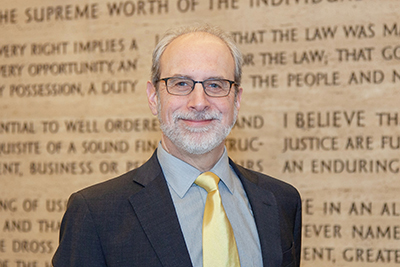
On his new role
It definitely still feels new, and I’m learning a tremendous amount on a daily basis. Although I’ve been closely involved with libraries and collecting institutions throughout my work as a historian and career in higher education administration, it’s a very different thing to be overseeing every aspect of one of these essential and highly complex institutions.
One of the ways that I’ve been educating myself is by meeting with every Library staff member to understand what they do, what they think works well, and where they see opportunities for improvement. Learning about the Library through these conversations has been a very rewarding and informative way for me to start. The staff’s loyalty and dedication to the Library and to Brown is amazing.
A big, and very exciting, focus for me currently, is leading the Library’s strategic planning effort. Over the past term, Library staff and I have been meeting with the leaders of all the key Building on Distinction initiatives. We want to be sure that the Library’s priorities are fully aligned with the University’s strategy. For Brown to have even greater impact as a research university, which is Building on Distinction’s central theme, it needs a library that provides all faculty and students with the kind of expertise, resources, programs and services that are essential for supporting world-class research and teaching.
On how his current role relates to graduate students
I’ve been involved in strengthening graduate education in various ways here at Brown and also in my previous job at the Mellon Foundation. Creating the best possible opportunities for the next generation of scholars and professionals to advance their fields is something I care about deeply. As University Librarian, I think graduate students are a vital constituency. Building on Distinction and, more recently, the University’s accreditation review are very clear that Brown’s ability to achieve its ambitions is strongly tied to the strength of its graduate programs. So, in order for the Library to make a significant contribution to achieving Brown’s strategic goals, support for graduate education and training is critical.
Currently, approximately three-quarters of graduate students visit the Library to access resources, consult with expert staff and simply do their work in a conducive environment. The creation of the Vincent J. Wernig Graduate Student Reading Room in the Rockefeller Library has been a transformative addition. We need to keep moving forward so that the Library is doing all it can to advance Brown’s academic excellence at the graduate level and help prepare graduate students for the jobs and careers they desire.
On ways to enhance Library services for graduate students
Right now, the Library leadership and I are in the process of analyzing the results of the 2018 Library Graduate and Medical Student Survey that we developed with the Graduate Library Advisory Council appointed by GSC. We’re really looking forward to learning what the respondents identify as the key areas where we could be doing more and where we are currently meeting expectations. This will be very important for setting our strategic and operational priorities.
I’m particularly interested in how the Library can play a more direct role in supporting graduate training. Many graduate students are, of course, already involved with the Library’s services and programs. But, I think we could work to create a stronger and more intentional connection between the disciplinary training that graduate programs provide and the Library staff’s considerable expertise in a broad array of scholarly tools, methods and skills.
I’d also like to see more graduate fellowship and proctorship opportunities in the Library, both to advance students’ own research and cultivate important scholarly skills that may be beneficial for their careers. Currently we are hosting a collaborative Interdisciplinary Opportunity fellowship between the Center for the Study of the Early Modern World and the John Hay Library, a proctorship in our Center for Digital Scholarship and a proctorship supported by our Mellon Foundation Digital Publications Initiative grant. Master’s students in Public Humanities have also been connected with the Library on a regular basis. I’d love to see an even larger graduate community being supported in the Library.
I’ve been learning more about the particular needs of master’s students in relation to library services. They can be quite different from those of doctoral students, so it’s really important that we are positioned to support this growing category in more effective ways. This is definitely part of our strategic planning work and collaboration with the Graduate School.
Services to highlight
I really want to make sure that all graduate students are aware of the workshops that Library experts regularly offer on a wide range of important scholarly skills and tools. This kind of training complements what students are learning in their disciplinary programs and can undergird their work both here at Brown and in their professional careers afterwards. A very partial list includes workshops on different aspects of the publishing environment (e.g., author rights, copyright, and Open Access publishing), maximizing online profiles and research impact, literature searching, scientific data management and sharing, research management software (NVivo, Endnote, Zotero), software and data carpentry, geographic information systems, data visualization, and digital humanities methods. Librarians also offer individual consultations tailored to students’ individual needs, but the workshops are a great place to start.
In closing, I would simply like to reiterate my excitement about being in this role at this time in Brown’s development. Strengthening graduate education is really important to me, and the Library has an important part to play in making Brown’s doctoral and master’s programs among the nation’s very best.